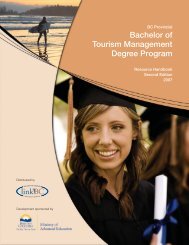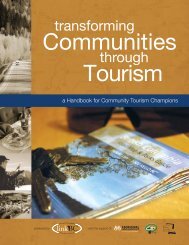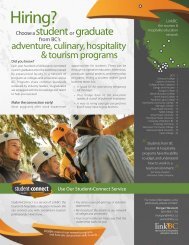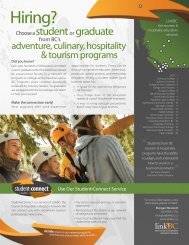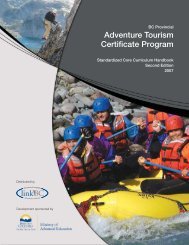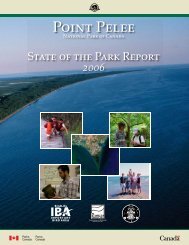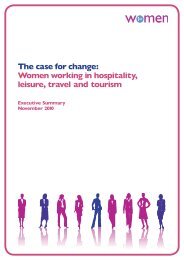Cultural Heritage Tourism Handbook - LinkBC
Cultural Heritage Tourism Handbook - LinkBC
Cultural Heritage Tourism Handbook - LinkBC
- No tags were found...
Create successful ePaper yourself
Turn your PDF publications into a flip-book with our unique Google optimized e-Paper software.
Authority4.2 Community-Based vs. Attractions-BasedWhile these are all valid perspectives, current research leans toward the term “authority,” meaningthe operator has been given permission by the appropriate cultural custodians to present certainstories to the public.For operators with First Nations stories, this may involve obtainingpermission from Band Councils, or community leaders. For operatorstelling broader stories, authority means working with local historygroups, museums, and provincial officials to make sure they arepresenting accurate, fair, and balanced information.How does “community-based” cultural/heritage tourism differ fromattractions-based tourism? To understand, pick up a visitor brochurefrom almost any Canadian destination. You’ll usually see a broadslogan touting some aspect of the community, and then a seriesof separate advertisements for various attractions, hotels, resorts,tours, and restaurants.in traditional tourism destinations each attraction operates as a“stand-alone” businesses, existing in a vacuum. The entire communityis dependent on the strength of the individual attractions to pullThis logo is an example of a programdesigned to ensure experiences are deliveredin a ‘respectful, truthful and quality manner’.-AtBCvisitors to the destination.A related challenge is that accommodations tend to be the largestrevenue earners in the tourism industry. Although few visitors willbe drawn to your town by comfy mattresses or crisp linens, typicallyhotels and resorts have larger marketing budgets. Accommodatorsshould be paying attention to their local tourism attractions, but thisdoesn’t always happen.As you can see, this ‘every business for themselves’ approach isrisky; visitors today have wide-ranging interests, and will almostcertainly want to be involved in more than one activity. Communitiesthat build and promote an integrated range of varying experienceswill have the advantage, which include:• Attracting and retaining more visitors, addressing multipleor overlapping interests.• Grounding tourism promotion in the full suite of communityofferings, tapping into the “sense of place” of thecommunity and using character to provide a uniqueselling proposition.• Building resident pride, turning ordinary citizens intoenthusiastic ambassadors for the destination.The next case study, profiling the community of Wells in BC, illustrateshow a community-based approach can yield tremendous results.28 29



